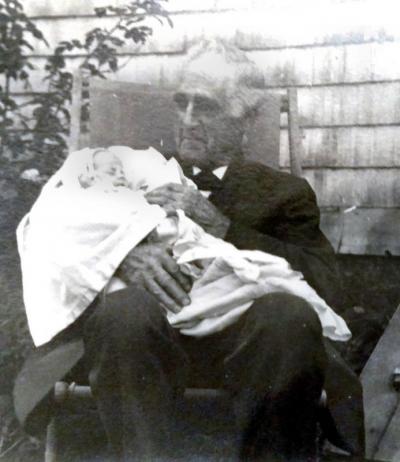How Job Gidley handled immigration in the late 1800s
The following is part 2 of a series explaining the man behind the Gidley School. Readers can expect memoirs and photos of both Gidley and his namesake school in the coming month. Ahead of its scheduled demolition, a memorial for the school will take place on February 13, 6 p.m., at Quinn Elementary.
It is significant that in this present time of turmoil and concern about receiving refugees, we can look back to 1899 when the subject of our study, was helping Russian immigrants settle into Canada.
[Related: The man behind Gidley School]
Job S. Gidley, 55, took a sabbatical year — a common Quaker custom in those days — away from his duties as town moderator, school administrator, and farmer to devote his energy and his intelligence to helping the persecuted Russian pacifists immigrate into Canada. He met their arriving ship at Halifax, Nova Scotia.
"Welcome, Doukhobors!" shouted Mr. Gidley in stentorian tones, and every heart on the tug, though the words were not uttered, cordially endorsed the Friend’s greeting. The sound of singing broke from the steamer’s decks. It was low and melodious, but very distinct. The Herald asked Prince Hilkoff, who was standing by the rail, to translate the words, which were translated: "God is with us, He has brought us through....”
— excerpt from the Halifax Herald
Another written contemporary description gives more detail.
Among those on board the ship were Messers. Joseph Elkington of Philadelphia, and Job Gidley of North Portsmouth (sic), Mass. Representing the committee of the American Society of Friends. The latter two are Quakers and have the quaint costume and speech of these brethren. They have taken great interest in the Doukhobors, and although both old men, braved a rough passage round from Halifax in order to be with them and help them on their way.
— excerpt from the 1899 Friends Intelligencer
On February 5, 1899, the Chicago Sunday Tribune published a lengthy report on the Doukhobors' immigration, which shows the degree of notoriety the event had at the time.
From one of the most despotic countries of the old world the scene changed to the most democratic of the new, and the suffering people received an hour after they reached port a cordial reception, not only from a Prince of their own country, but from accredited representatives of the land of their adoption. Half an hour after doctors Montizambert, McKay, and Jones, the Canadian quarantine officials, boarded the Lake Huron on Friday afternoon, the steam tug Henry Hoover left Corbett's wharf, having on board James A. Smart, Deputy Minister of the Interior; Will J. White, Inspector of United States immigration Agencies; William Anderson Canadian government interpreter; Prince Hilkoff and John Ivan, his Doukhobor in; Joseph H. Elkinton of Philadelphia and Job Gidley of Dartmouth, Mass. Representatives of the American Society of Friends.
— excerpt from "Russian Quakers find their Plymouth Rock," Chicago Sunday Tribune
Readers will notice the "vetting." Although a popular term today, in Gidley's day, it had to do with checking for diseases, and physical and mental disabilities.
Subsequent issues of the 1899 Friends Intelligencer reported on the progress of the refugees as they traveled by train out to Western Canada where they received land grants and proceeded to settle down. Gidley stayed with them and wrote articles for the Friends Intelligencer, which illustrate his wide knowledge and the many ways in which he assisted this group.
Gildey's tales, titled “Notes of a Visit to Doukhobor Villages,” indicate that he spent most of his sabbatical year helping these refugees adapt to farming in this part of the world. It is fascinating reading, and can be found in a free, public eBook on Google (check out pages 770, 824, and 844).
It was not an exaggeration when I started this series by stating that Job S. Gidley was "a man on a white horse," both literally, because he rode around Dartmouth on that horse, but also figuratively, since he extended himself so much for refugees and other needy people.
Robert E. Harding is the President of the Dartmouth Historical & Arts Society and a member of the Dartmouth Historical Commission. Email him at sir_ice_man@hotmail.com.












